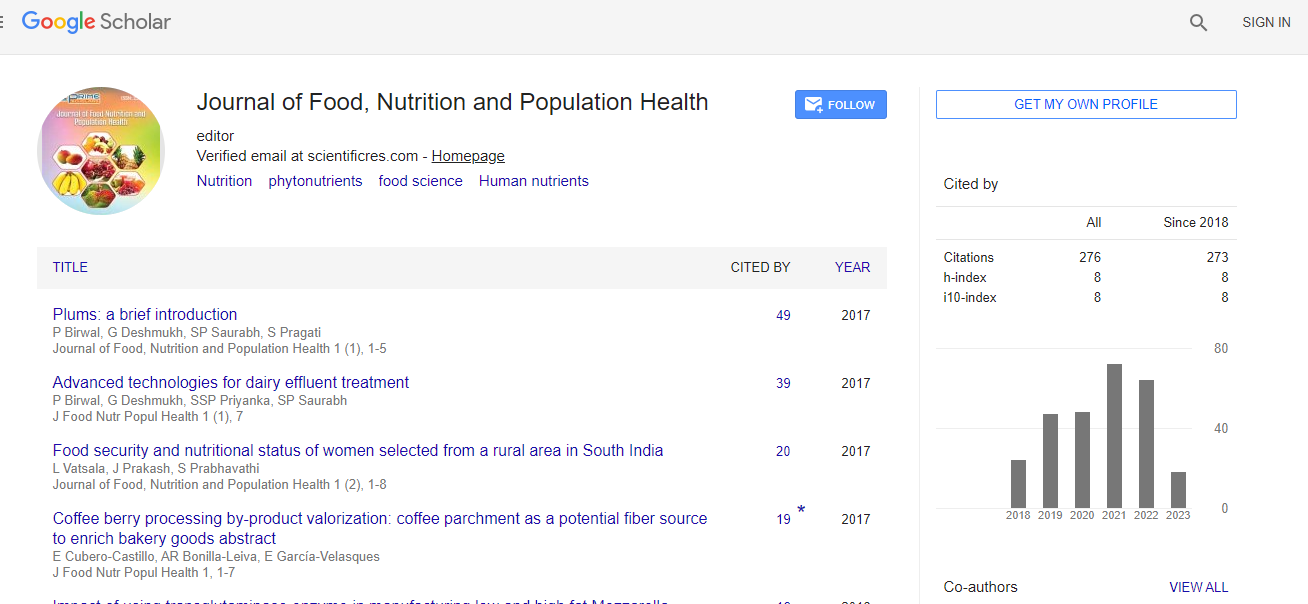Short Communication - (2023) Volume 7, Issue 1
Large-Scale Survey on Rural Children and their Caregivers in Rural China
Jennifer Russomanno*
Department of Public Health, Renmin University of China, China
*Correspondence:
Jennifer Russomanno,
Department of Public Health, Renmin University of China,
China,
Email:
Received: 02-Jan-2023, Manuscript No. ipjfnph-23-15604;
Editor assigned: 04-Jan-2023, Pre QC No. ipjfnph-23-15604 (PQ);
Reviewed: 18-Jan-2023, QC No. ipjfnph-23-15604;
Revised: 23-Jan-2023, Manuscript No. ipjfnph-23-15604 (R);
Published:
30-Jan-2023, DOI: 10.21767/2577-0586.7.01.02
INTRODUCTION
This study aims to engage rural parents to provide a contemporary
experience of ensuring the well-being of rural youth by
consuming these humble but unhappy and dangerous food
sources. Children in grandparental care, in contrast to children
in parental care, were more likely to be affected by trends and
levels of nutritional understanding because their grandparents
were less educated, older, and older. Attributed to I tend to enjoy
my grandchildren. In each case, our results indicated how
old these parental figures were, and training level was not a
significant variable influencing children’s goals. Land guards
were guaranteed to fare worse when it came to developing
better eating habits in their children than other types of parent
characters. This seems to contradict the conventional wisdom
that parents are the best nutrition coaches. We gave another
piece of knowledge to understand the disappointment of aging
land guards, who are very good role models for children. I was
11 years old and my parents were between 35 and 45 years old.
I learned that the ages of current guardians are quite different
from those of relatives and grandparents. According to a verifiable
view, when the current country’s guardians were children,
the rapid improvement of the economy and the limited
administrative resources of China’s provinces encouraged the
dangerous development of undesirable food sources in naive
markets. Far more familiar with food sources than their parents,
as they can start eating them early in life. Rural areas are
experiencing contemporaneous parental relocations and a lack
of parental education and wise dietary management. Both of
these two authentic foundations added to the very outcome
that the on-going guardians become the original that had unhindered
admittance to a lot of scrumptious and brilliant food
varieties however with inadequate parts or are unhygienically
ready, which never occurred at their folks’ young life.
Description
Accordingly current guardians’ innate expectation and inclination
for those undesirable food sources would be a lot higher
than current grandparents, which could promote adversely
influence the exhibition of their schooling toward their kids.
Consequently, under the foundation of Chinese explicit verifiable
period and culture, we propose another proof connected
with provincial guardians’ impact on youngsters’ undesirable
food decisions, which was that the on-going rustic guardians’
unfortunate eating insights and propensities have begun to
apply intergenerational consequences for their kids’ food decision.
The principal commitment of our discoveries was that the
on-going arrangements of empowering country kids to grow
up with their folks could assist with tackling the vast majority
of the issues of being abandoned, nonetheless, they couldn’t
actually shield rustic youngsters to avoid the food sources with
wellbeing and wellbeing gambles [1-4].
Conclusion
We further researched the impact of guardians’ nurturing
mentalities and found that the kids really focused on by various
parental figures bunch contrasted essentially concerning their
risky food goal and inclination. A herd of carefree guardians
exhibits the most aloof nurturing spirit, and their young, even
floating parent-figure and ignorant parent-figure offspring,
perform far more regrettable executions for undesirable food
sources. The results suggest that, in rural areas, parental hesitation
and lack of relevant information due to low levels of education
are not the main barriers to compelling youth health
education.
Acknowledgement
None.
Conflict of Interest
The author’s declared that they have no conflict of interest.
References
- Taber DR, Chriqui JF, Quinn CM, Rimkus LM, Chaloupka FJ (2016) Cross-sector analysis of socioeconomic, racial/ethnic, and urban/rural disparities in food policy enactment in the United States. Health & Place 42:47-53.
[Crossref][Google Scholar]
- Kim MJ, Kim SA, Kang YS, Hwang IG, Rhee MS (2013) Microbial diversity and prevalence of foodborne pathogens in cheap and junk foods consumed by primary schoolchildren. Lett Appl Microbiol 57(1):47-53.
[Crossref][Google Scholar]
- Seo KW, Kim JP, Cho BS, Gang GL, Yang YS, et al (2009) Study on safety of children snacks in school zone. J Food Hyg Saf 24(2):154-161.
[Crossref][Google Scholar]
- Chen X, Cisse-Egbuonye N, Spears EC, Mkuu R, McKyer ELJ (2018) Children’s healthy eating habits and parents’ socio-demographic characteristics in rural Texas, USA. Health Educ J 77(4): 444-457.
[Crossref][Google Scholar]
Citation: Russomanno J (2023) Large-Scale Survey on Rural Children and their Caregivers in Rural China. J Food Nutr Popul Health.
7:02.
Copyright: © 2023 Russomanno J. This is an open-access article distributed under the terms of the Creative Commons Attribution
License, which permits unrestricted use, distribution, and reproduction in any medium, provided the original author and source
are credited.

